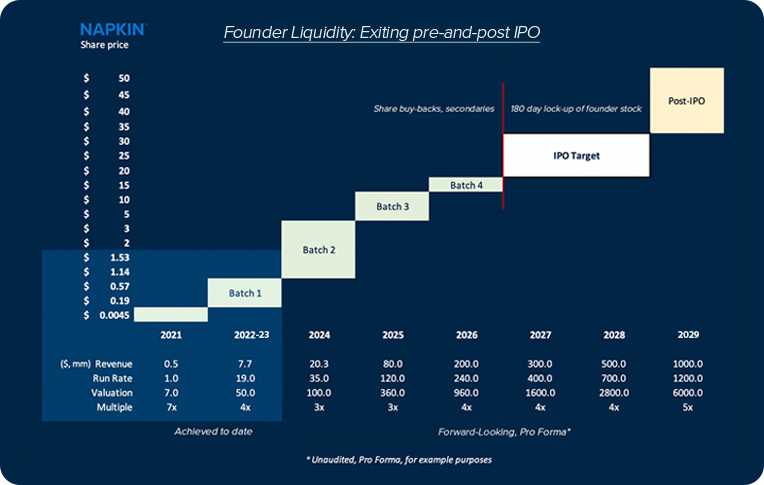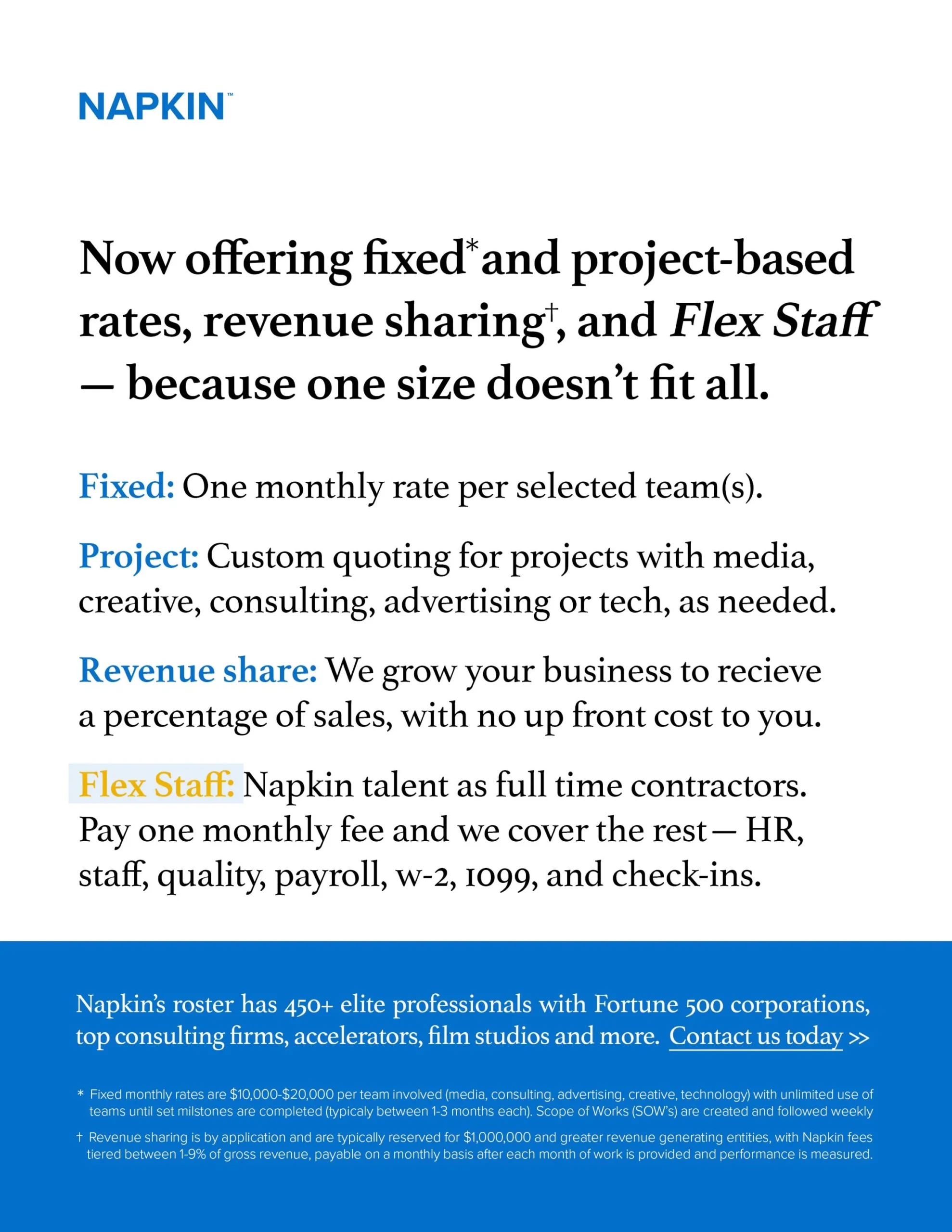
How we make it happen
1.Acquire
Profitable businesses. Founders who want to win. IPO ($NPKN) by 2027 📈
STOCK & GROWTH CASH
We acquire using cash & Napkin shares. We bring in cash to grow. All staff get employee stock option plans.
2.Optimize
Cross-sell together.
Win deals and lower OPEX.
Cash is 
POSITIVE CASH FLOW
High revenue and profitability is what we want. The bankers love us for this. You’ll thank us later.

Founders build product.
Napkin keeps acquiring.
Share price goes 🚀
$10+ PER SHARE AT EXIT
We look for the best builders on the planet. Digital disruption is key for a juicy Napkin valuation at IPO.


Secret SauceThe founders.

- Founder Batches Napkin groups multiple founders’ revenues together and conducts batches of acquisitions simultaneously. This ensures guaranteed growth, diversified risk for all, and transparency across our shareholder ecosystem.
- Founder Strength We are a group of elite founders. We provide strength to founder‘s operations, finances and back-office. We don’t come in and uproot people and systems — we honor and empower each other synergistically.
- Founder Liquidity Napkin plans to IPO after completing four batches with a valuation surpassing $1bn. Pre-IPO liquidity options include share buy-backs and secondaries. The IPO is targeted for high-volume markets like TSX and NASDAQ,

Acquiring process: Powered by AAA’s
1. APIs
Get lightning-fast due diligence done, with API scans of sales info
and accounting portals.
2. AIs
AI helps us batch financials together with other acquisitions to see the shareholder value we can create.
3. Algos
Algorithms provide a synthesized and trusted data source to get fast board approvals on acquisitions.
+
Good
people.
We work tirelessly to make acquisitions incredibly simple. So you can keep on going. And going. And going…

Friends with benefits
As our network grows, so does the advantages.
- Global Networking
- Access Growth Capital
- C-Level Training
- Enterprise Clients
- Award-Winning Talent
- Fortune 500 Portfolio
- Culture of Winners
- Large Catalogue
- Passion-Focused
- Management Retreats
- Administrative Support
- Elite Advisory
- Major Conferences
- Friendships for Life
- Achieve Larger Exit
“It’s all about giving and
receiving.” — Anonymous (you know who you are)


Let’s Make A Napkin Deal.
Plug in some high-level info to see what you could qualify for.

Yes, we’re global.
The best talent and companies on earth are being acquired by Napkin 🙌 .
$1 Billion+
Minimum Target
Market Cap at IPO
$250 Million+
Current Pipeline
of Acquired Revenue
350+ Staff
Employed by Napkin
Companies

 Napkin Canada
Napkin Canada Napkin USA
Napkin USA Napkin India
Napkin India Napkin UAE
Napkin UAE Napkin Ecuador
Napkin Ecuador
And many more to come…
Elite digital talent
Take a look inside what Napkin has to offer. No srsly.
Industry Leaders Coming Together as Napkin.
Our team mean the 🌎 to us. What do they think about Napkin?










“To be part of Napkin is to live under the maxims of respect for the identity of companies and constant search for integration between enterprises. That is why we live in a day-to-day growth where entrepreneurs from various countries put the best of their abilities to be better together.”
Martha Concayo
Napkin LATAM CEO


“Joining Napkin Inc. as their accountant from the very beginning is a dream come true. It’s an honor to be part of this incredible journey, ensuring financial clarity and growth for a company I deeply admire. Together, we will build a legacy of success and innovation.”
Suzana Seis-Manto
Corporale Controller




“I am thrilled to announce that Napkin Inc is now at the forefront of the Middle East’s vibrant business landscape. The region’s boundless potential excites us as we lead our dynamic expansion. Our bold vision is to drive forward with innovative companies, all steering towards a transformative IPO journey.”
Rami Alcheikh
CEO Napkin Dubai
















Know someone who’d be a good fit? We’ll pay for leads that turn into Napkin deals.

Built by Entrepreneurs, who love Entrepreneurs
“We’re two best friends and entrepreneurs that love travelling the world and trying to change people’s lives. From fair trade cocoa exporting in Africa to software developing in India — we found people are people, everywhere. They usually just want a hand up, not a hand out. So we said, ‘let’s make a way to give it to them!'”
Meet the Founders, Grant Anderson & Matthew Liberto


Our Brands are in the news:
























